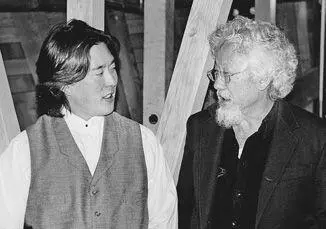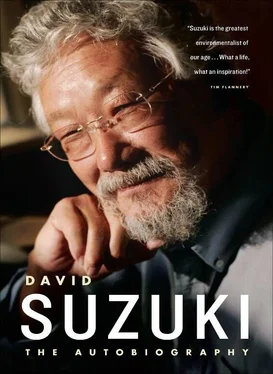It's not all hopeless if we can transcend the current conceit that what is the latest is the best, that history and the past are mere academic pursuits. We can learn much from lessons of the past; indeed, we can find ways to husband scarce resources and even replenish and expand them by applying ancient methods.
In 1995, a geologist, John Harper, was flying in a plane along the British Columbia coast at low tide when he noticed semicircular structures radiating out from shore at the tide line. He recognized that they were not natural and must have been made by people. He investigated these structures, which have now been found up and down the coast of B.C., and today it is recognized that the original people on the coast created them by placing stones at low tide. Over time, the incoming tide would wash shells, sand, and debris over the rocks and into the semicircle, perfect beds for clams. In fact, these were “clam gardens,” deliberately created so that clams could be harvested on a regular basis.
When Severn began her graduate degree with the noted University of Victoria ethnobotanist Nancy Turner, she learned about clam gardens and met Adam Dick, a Kwakwaka'wakw elder who was traditionally educated and knew about many of the traditions lost by most tribes. Severn was sure the rock structures along the connection between Tangwyn and Heriot Island were not natural and took Adam to look at it. “Oh, yes, that's a loki way ,” he said, matter-of-factly. It was indeed a human-made clam garden, and that also explained the midden we had found on the property near the beach.
For centuries, explorers finding new lands occupied by aboriginal peoples have dismissed those peoples as primitive savages lacking the technological evidence of civilization. We are only now realizing that, in fact, thousands of years of observation and thought had created a profound knowledge base that allowed people not only to exploit nature's abundance but also to enhance certain parts of its productivity, from clams to forests.
SEX HAS BEEN a driving force in my life. In today's liberated society, the ideas about sex I grew up with seem quaint at best, naive at worst. Chastity and premarital virginity of prospective brides were still hoped for and highly prized. Where the men were to gain their experience, I have no idea, because certainly paying for sex was not socially acceptable. Puberty hit me like a concrete wall, testosterone hammering through my body and wreaking havoc on my brain when I was about twelve. Only as age has brought relief from the high titer of sex hormones have I been freed of thinking of sex once a minute. Now it's about once every five minutes.
I am delighted to see the role sex plays in the lives of Tara and my daughters; it is part of their lives but doesn't necessarily mean a permanent commitment. It just seems so much healthier to be able to have sex instead of the prolonged and agonizing petting sessions that passed for sex in my youth. When I was a boy, it was widely believed that for many women, if not most, sex was not a pleasure but something to be borne. Frigidity was widely regarded and accepted as most women's lot, a notion I am sure women today would vehemently reject. My generation placed far too much value on the act of sex itself.
As well as being liberated to explore their bodies and sexuality to the fullest, women are breaking down gender barriers as I never dreamed would be possible in my lifetime. My daughter Tamiko decided to play team hockey when she was in her late thirties, and though I never saw her play, she is such an athlete that I'm sure she did very well. I say “did” because she was forced by knee problems to give it up after a few seasons. When I was a young man, we would never have imagined teams of middle-aged women playing ice hockey. I have delighted in cheering on Severn and Sarika as they played a kind of basketball that wasn't practiced in my youth; when I was in high school, girls in “bloomers” were allowed to dribble the ball twice before passing, a completely different game from the rough-and-tumble sport today. My niece, Jill Aoki, was a soccer star, as is my granddaughter, Midori.
As women have been widening their athletic opportunities, academically they have exploded ahead. I well remember my high school graduation in 1954, when perhaps 10 percent of my class went on to university and boys captured most of the prizes and awards. Almost fifty years later, when I attended Severn's and then Sarika's graduation, girls earned most of the awards and held incredible records of community and extracurricular service.
Women now make up more than 60 percent of university undergraduates, more than half of students in graduate studies, medicine, and law schools, and a rapidly increasing number are enrolling in engineering, agriculture, and forestry, areas traditionally male domains. The social ramifications of this huge gender shift will reverberate through society for decades, I am sure.

Troy and me in the hull of the Klondike , a sternwheeler boat in Whitehorse, Yukon, that Troy was helping to restore
I wonder, however, about the boys who are not winning the awards they once did and who are not going on to university, but not because I think they should be represented fifty-fifty. Personal experience tells me that women mature socially and intellectually much sooner than boys. I know I was brain-damaged by testosterone and figure I'm just starting to catch up to women, except that senility threatens to intrude any minute. My son, as much because I was his father as anything else, did not complete university and graduated instead from Emily Carr Institute of Art + Design in Vancouver. He has become an excellent carpenter and, more recently, an accomplished boatbuilder, and I am very proud of what he has become. Yet I worry as I watch him inform others, almost apologetically, that he never completed university.
Has university become the standard by which we measure a person's worth? If so, it is a mistake. I have as much regard for Troy's talent as a carpenter and boatbuilder as I have for any academic with a bachelor's degree or even a PhD. And every time my car breaks down or my sewer gets plugged, I am very grateful to and admiring of the tradespeople who come to my rescue.
The declining proportion of men in academia may, as the Fraser Institute suggests, reflect discriminatory standards, although I doubt it. I believe we have the opportunity to get our priorities and values right. Yes, we need academically trained people, as we need violinists, artists, and so many other talents. In a multicultural society such as Canada's, diversity has become our great strength, and we have to find ways to honor that diversity, especially as gender barriers are removed in most occupations.
One serious challenge of this gender shift is the conflict between a woman's professional ambitions and the biological imperatives of her body. The decline in fertility after the age of thirty is quite dramatic and often leads to heroic medical interventions, such as in vitro fertilization for older women. Could we develop ways for women to have it both ways, to pursue a career while also having children?
My wonderful secretary, Shirley Macaulay, worked for me for more than twenty years until she was forced to retire by the university. I despaired of finding someone who could replace her as both efficient secretary and friend. When Shirley and I finally interviewed Evelyn de la Giroday, we both agreed she would be an ideal replacement, younger, experienced, and willing to be firm if necessary. I was very disappointed to learn that Ev was pregnant and that she wanted to spend quite a while with her baby before returning to work. “What about bringing the baby to the office, where you could nurse her and still work?” I asked.
Читать дальше



![David Jagusson - Devot & Anal [Hardcore BDSM]](/books/485905/david-jagusson-devot-anal-hardcore-bdsm-thumb.webp)









